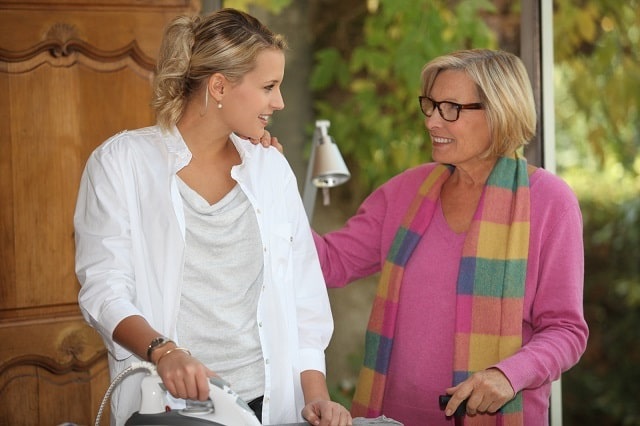If your elderly mother wants constant attention, you’re certainly not alone. It’s a common complaint among adult children, particularly those who are their parent’s primary caregiver. There are several reasons why your elderly mother might be wanting more of your attention (or never seem happy), and the reasons behind her behavior are the key to finding a satisfactory compromise that works for both of you.
How Much Attention is Too Much?
There’s no one-size-fits-all answer to this question. Some family caregivers have school-aged children at home and careers to juggle alongside their caregiving duties, making it especially difficult when an elderly parent begins to demand more of your already-limited time and attention. You may not want to care for your elderly mother due to your past relationship or other concerns, and that’s okay too. Adult children aren’t always the ideal caregivers for their aging parents.
In general, your elderly mother’s desire for constant attention becomes too much when it starts to hinder your ability to handle your other responsibilities. It’s also important to treat time for self-care with just as much importance as you do your day-to-day responsibilities. Without time to recharge, you’re more likely to experience caregiver burnout – and far sooner than you might otherwise.
Why Does Your Elderly Mother Want Constant Attention?
The first thing to do if your elderly mother is beginning to demand too much of your time and attention is to try to uncover the reasons why she might be increasingly needy. Let’s discuss a few common reasons why this happens:
- Gradually increasing caregiving duties. One possible cause is that your caregiving duties may have started out with a few simple tasks and gradually increased to the point at which it’s become unmanageable for you. In this case, your mother may not even realize that she’s placing too many demands on you.
- Your mother is lonely. Has your mother recently lost her spouse or a close friend? The sudden loss of a loved one with whom she once spent a great deal of time can leave her feeling lonely and lost.
- The stress of major changes. Perhaps your mother has experienced a major life change, such as moving to a different city to be closer to you or other family members. Major life changes can lead to stress for anyone, but when they occur later in life, they can be particularly stressful as older adults. Your mother may be thinking about her mortality and as a result, wanting to spend as much time with you as she can while she can.
- Underlying mental health concerns. It’s possible that your mother is coping with the symptoms of depression, anxiety, or another mental health condition and wants your constant attention because your presence gives her comfort.
- Underlying physical health concerns. Like mental health concerns, physical health conditions can also be a contributing factor if your elderly mother is demanding too much attention. She may be experiencing the early symptoms of Alzheimer’s disease or dementia, or she may be experiencing side effects from medication or symptoms associated with other health conditions. As with underlying mental health concerns, in these cases it’s possible that your presence brings your mom a sense of comfort and security.
- Your behavior as a caregiver has made her more dependent. It’s also possible that your mother wants constant attention because your past behaviors have made her more dependent on you. Obviously, this isn’t something that adult children do intentionally, but it’s common for caregivers to say ‘yes’ to everything, whether because they feel guilty about saying no or because they want to be helpful. However, taking care of things that your mother can still do herself can easily increase her dependency on you.
Of course, these are only a few common reasons why your elderly mother might be demanding constant attention. Consider all possible factors and take steps to address the most likely causes.
What to Do When Your Elderly Mother Wants Constant Attention
Depending on the reasons you believe are contributing to your mother’s behavior, there are several steps you can take to address it.
Talk to Your Mother
This is almost always a conversation that no one wants to have, but it’s important to let your mother know that her demands on your time and attention are stretching you too thin. She may not have realized that she was so dependent on you, and sometimes, bringing it to her attention is all that’s needed to resolve the issue.
Get Others Involved
If you have siblings or other family members who can help tend to caregiving duties or day-to-day tasks that your mom can no longer manage, get them involved and ask for help. Dividing up the responsibilities among several trusted friends and family members can help to reduce your mom’s dependence on you, giving her multiple people to interact with and turn to for help.
Rule Out Mental and Physical Health Concerns
If you suspect that your mom’s increasing need for attention may be due to physical or mental health conditions or even medication side effects, talk to your mom’s healthcare provider. Keep notes leading up to the appointment documenting any symptoms and behaviors you notice, which can help her doctor make an accurate diagnosis. If she’s diagnosed with a physical or mental health condition that could be contributing to her behavior, getting treatment can make a world of difference.
Get Your Mom Involved in Activities
If your mom is lonely or has experienced a recent major life change or the loss of a friend or loved one, getting her involved in senior activities with others can often be the best thing you can do for her – and for yourself. Contact your local Area Agency on Aging (AAA) to find out what senior centers or adult daycare centers are in your area and what programs they offer. Then, talk to your mom about what kinds of activities she’d be interested in participating in.
Consider a Retirement Community
Another way to help your mom maintain an active lifestyle with opportunities to socialize with other older adults is to consider whether it’s time for her to move to a retirement community. Continuing care retirement communities offer several levels of care on the same campus, allowing residents to move to assisted living or long-term care as their health and care needs change while remaining in a comfortable and familiar environment.
In addition to ensuring that your mother’s care needs will be met throughout her life, these communities also offer abundant opportunities for residents to engage in activities, meet like-minded older adults and develop lasting friendships, and take advantage of an array of services and amenities. With so much to do and ample on-site health and wellness services, your elderly mother might be so busy that she doesn’t call you for weeks – and you might find yourself reaching out to her to check in for a change.
Not only do retirement communities make it easy to make new friends and maintain a vibrant lifestyle, but communities like Arbors of Hop Brook offer a wide variety of services and amenities such as on-site massage services, an on-site beauty parlor, rooms for activities and arts and crafts, on-site exercise facilities, game rooms, dining services, and more. A continuing care retirement community, Arbors of Hop Brook offers a continuum of care – including assisted living and long-term care on the same campus – to ensure that your mom’s care needs will be met as they change over time.
FAQs About Elderly Parents Wanting Constant Attention
How do I respond if my elderly mother’s need for attention feels overwhelming?
It’s important to set healthy boundaries. Acknowledge your mother’s feelings, but gently explain the need for balance in your life. You can suggest structured activities or hobbies to keep her engaged when you’re unavailable, or involve friends, family, or community groups to provide her with additional social support.
What activities can I engage in with my elderly mother to make her feel more valued?
Spending quality time together can help her feel appreciated. Consider activities like reminiscing over family photos, going for walks, cooking together, or engaging in hobbies she enjoys. Regularly including her in family gatherings or community events can also help strengthen her sense of value and connection.
How do I handle feelings of guilt when I can’t give my elderly mother as much attention as she wants?
Feeling guilty is common when caring for a loved one, but it’s important to recognize your limits. Remind yourself that you are doing your best, and it’s okay to seek help from others. Try to focus on quality rather than quantity of time spent with your mother, and ensure you take care of your own well-being to be more present when you are with her.


